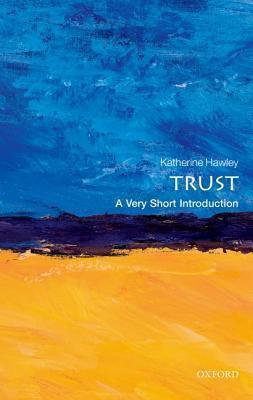Trust: A Very Short Introduction

Trust: A Very Short Introduction
Trust is indispensable to our everyday lives, yet it can be dangerous. Without trusting others, we cannot function in society, or even stay alive for very long, but being overly trustful can leave us open to exploitation and abuse. And not only is trust pragmatic, but it also has a moral dimension: trustworthiness is a virtue, and well-placed trust benefits us all. In this Very Short Introduction, philosopher Katherine Hawley explores the key ideas about trust and distrust. Drawing on a wide range of disciplines, including philosophy, psychology, and evolutionary biology, she emphasizes the nature and importance of trusting and being trusted, from our intimate bonds with significant others to our relationship with the state. Considering questions such as Why do we value trust? and Why do we want to be trusted rather than distrusted? Hawley illuminates the importance of trust in the personal and public spheres. Moreover, she draws on a range of research to show how trust stands at the center of many disciplines, including biology, psychology, and game theory. The book also examines the evolutionary aspects of trust.
Trust is indispensable to our everyday lives, yet it can be dangerous. Without trusting others, we cannot function in society, or even stay alive for very long, but being overly trustful can leave us open to exploitation and abuse. And not only is trust pragmatic, but it also has a moral
dimension: trustworthiness is a virtue, and well-placed trust benefits us all. In this Very Short Introduction, philosopher Katherine Hawley explores the key ideas about trust and distrust. Drawing on a wide range of disciplines, including philosophy, psychology, and evolutionary biology, she
emphasizes the nature and importance of trusting and being trusted, from our intimate bonds with significant others to our relationship with the state. Considering questions such as Why do we value trust? and Why do we want to be trusted rather than distrusted? Hawley illuminates the importance
of trust in the personal and public spheres. Moreover, she draws on a range of research to show how trust stands at the center of many disciplines, including biology, psychology, and game theory. The book also examines the evolutionary aspects of trust.
Trust is indispensable to our everyday lives, yet it can be dangerous. Without trusting others, we cannot function in society, or even stay alive for very long, but being overly trustful can leave us open to
PRP: 80.54 Lei
Acesta este Prețul Recomandat de Producător. Prețul de vânzare al produsului este afișat mai jos.
72.49Lei
72.49Lei
80.54 LeiLivrare in 2-4 saptamani
Descrierea produsului
Trust is indispensable to our everyday lives, yet it can be dangerous. Without trusting others, we cannot function in society, or even stay alive for very long, but being overly trustful can leave us open to exploitation and abuse. And not only is trust pragmatic, but it also has a moral dimension: trustworthiness is a virtue, and well-placed trust benefits us all. In this Very Short Introduction, philosopher Katherine Hawley explores the key ideas about trust and distrust. Drawing on a wide range of disciplines, including philosophy, psychology, and evolutionary biology, she emphasizes the nature and importance of trusting and being trusted, from our intimate bonds with significant others to our relationship with the state. Considering questions such as Why do we value trust? and Why do we want to be trusted rather than distrusted? Hawley illuminates the importance of trust in the personal and public spheres. Moreover, she draws on a range of research to show how trust stands at the center of many disciplines, including biology, psychology, and game theory. The book also examines the evolutionary aspects of trust.
Trust is indispensable to our everyday lives, yet it can be dangerous. Without trusting others, we cannot function in society, or even stay alive for very long, but being overly trustful can leave us open to exploitation and abuse. And not only is trust pragmatic, but it also has a moral
dimension: trustworthiness is a virtue, and well-placed trust benefits us all. In this Very Short Introduction, philosopher Katherine Hawley explores the key ideas about trust and distrust. Drawing on a wide range of disciplines, including philosophy, psychology, and evolutionary biology, she
emphasizes the nature and importance of trusting and being trusted, from our intimate bonds with significant others to our relationship with the state. Considering questions such as Why do we value trust? and Why do we want to be trusted rather than distrusted? Hawley illuminates the importance
of trust in the personal and public spheres. Moreover, she draws on a range of research to show how trust stands at the center of many disciplines, including biology, psychology, and game theory. The book also examines the evolutionary aspects of trust.
Trust is indispensable to our everyday lives, yet it can be dangerous. Without trusting others, we cannot function in society, or even stay alive for very long, but being overly trustful can leave us open to
Detaliile produsului











